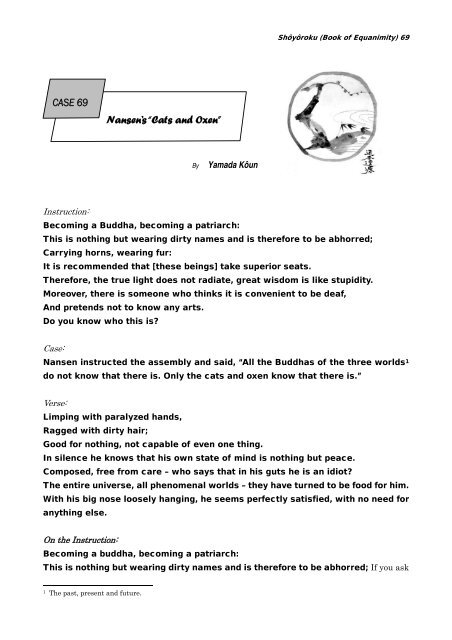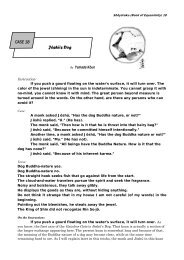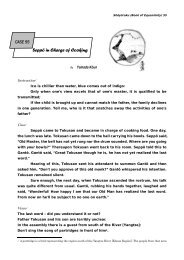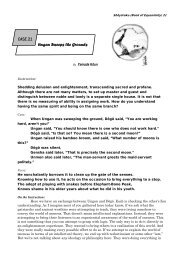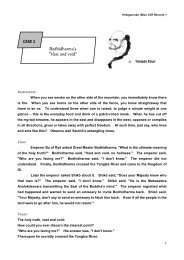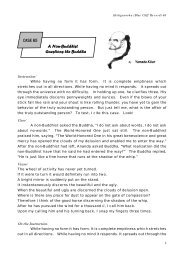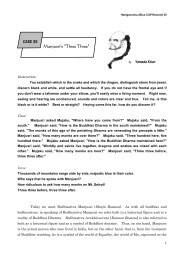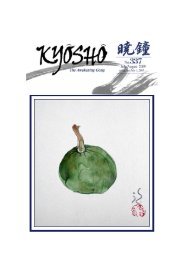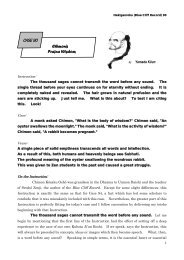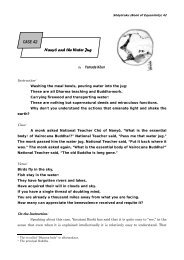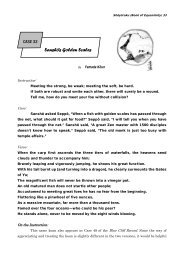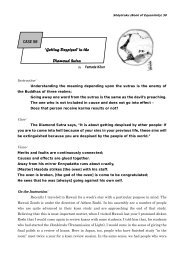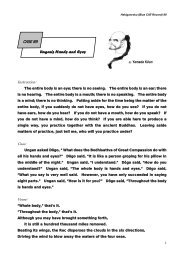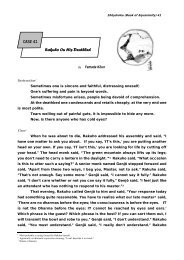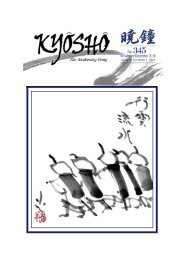Shoyoroku 69
Shoyoroku 69
Shoyoroku 69
You also want an ePaper? Increase the reach of your titles
YUMPU automatically turns print PDFs into web optimized ePapers that Google loves.
Shôyôroku (Book of Equanimity) <strong>69</strong>whom this is referring to, it means the person known in the Shôdôka as the “leisurely person ofthe Tao, who has exhausted study and is without doing.” This is the state of consciousness of aperson who has exhausted all practice and reached a state of perfect peace of mind. To speak interms of becoming a Buddha or becoming a patriarch is just to use dirty names. Why is thename Buddha dirty? Why is the name patriarch dirty? Because words like Buddha or patriarchare all concepts. It is not there is actually anything like Buddha. It is just when there are nomore concepts in your head that we give it the name Buddha. It’s the same as me receiving thename Kyôzô Yamada. And there is really a person who hates the word Buddha. His name isShidô Bunan Zenji. As you might know, he was the teacher of Shôju Rôjin, who was the masterof Hakuin Zenji. I consider Shidô Bunan Zenji to be a truly outstanding person. I have writtenabout him in the Opening Comments of the latest issue of our magazine Kyôshô, so please havea look at it. Shidô Bunan Zenji was originally the innkeeper of a watering place along theTokaido Road at that time. He became a student of the Zen master Gudô Oshô. This Gudô Oshôtraveled back and forth several times between Kyoto and Edo (present-day Tokyo) along thishighway and evidently stayed at this inn a number of times. As a result, Shidô Bunan began toreceive the instruction of Gudô Oshô and eventually devoted himself to authentic practice. Hedecided to become a monk. Up to then he had devoted himself to carousing, to the extent thatthe family became quite disgusted with him. When I ask myself why he was carousing so much,I can surmise that he wanted everyone to think that he was no longer required at the inn, sothat he would then be free to become a monk. Once when Gudô Zenj was traveling from Kyototo Tokyo, he stayed overnight at the inn. The two men talked until deep in the night. The nextmorning Gudô Zenji continued on his way. Shortly after that, the master of the inn left home,never to return again. He went to Tokyo and practiced in a little hut-like dwelling. This wasprobably his continued practice after realizing enlightenment. As time went on, word gotaround that a very special person was living in the vicinity. Shôju Rôjin wanted to meet a trueZen master and traveled to Tokyo with that intention. I’m not sure if Shidô Bunan alreadycalled his hermitage Shidôan starting around that time, but at any rate Shôju Rôjin visited himin his dwelling. When he paid a visit, he found Shidô Bunan Zenji sitting in a ramshackledwelling on worn-out tatami matting. But one look was enough for him to confirm that he hadmet his true teacher. This really speaks well for Shôju Rôjin. Shidô Bunan Zenji was definitelynot a learned man, but he nevertheless wrote truly outstanding waka 2 poems. Alsooutstanding are his dôka or “songs of the way.” You would all do well to give them a perusal, ifyou have a chance. I have been looking over just the ones consisting of four lines. Many of themwarn us against being duped by the concept of Buddha (hotoke-sama). Here is an example:“Even if you fall head first into Avici hell, don’t ever think of becoming a Buddha” (sakashimani abijigoku e otsurutomo hotoke ni naru to sara ni omouna). The Avici hell is the most2 Waka (literally "Japanese poem") or Yamato uta is a genre of classical Japanese verse and one of the major genresof Japanese literature. The term was coined during the Heian period, and was used to distinguishJapanese-language poetry from kanshi (poetry written in Chinese by Japanese poets), and later from renga.2
Shôyôroku (Book of Equanimity) <strong>69</strong>gruesome of the traditional “eight hells” of Buddhism. This is truly outstanding. Shidô BunanZenji doesn’t mince words. I believe such penetrating individuals are rare in the Rinzai School.I personally believe he is a match for Dôgen Zenji when it comes to his profound state ofconsciousness. Here is another verse of his: “No matter what, no different from an ordinaryperson, Buddhas and patriarchs are great devils” (nanigoto mo bonjin ni kawaru koto nashibusso to iu mo daima nari keri).He uses the word “devils” to indicate concepts. Here is yet another verse: “What is Buddha?Fools have started saying it, and people are deluded by something without a name” (hotoke towa nani baka na yatsu ga iisomete na mo naki mono ni mayoi koso sure). Who is it that startedsaying Buddha? What fools they are! The real thing is nothing at all. It is because they attach aname like Buddha to it that they are all deluded. He has clearly realized his true self. Here isyet another verse: “When I hear someone asking what Buddha is, I feel like my ears have beendirtied” (hotoke wa to tazunuru koe wo kiku toki wa mimi no kegagaruru kokochi koso sure).Here is a Japanese who can compose such poems. This is the time to take a second look atShidô Bunan Zenji. He is of a different sort than Hakuin Zenji, we might say. He is different incharacter. Hakuin Zenji was a genius, especially when it came to literary gifts to compose textsand poems. Shidô Bunan Zenji could be said to have been completely lacking in such breedingand culture. There are almost no difficult statements in his writings. For example, with himthere is no taint or trace of having read such works as the Blue Cliff Record, Gateless Gate orBook of Equanimity. When it comes to Shôju Rôjin, we can clearly detect the traces of hishaving read the Blue Cliff Record. A copy of that work could be found in the hermitage Shôjuanwhere he resided. As for Hakuin Zenji, there were many literary remains in the form of hisvoluminous writings. In that sense he was an inimitable genius. Nevertheless, I believe heneeds to undergo further inspection when it comes to his enlightened dharma eye. This is notthe time or occasion for me to speak in detail about this matter, and I feel that I that I mustdelve myself more deeply into the matter. Let me just say here that I hold Shidô Bunan Zenji ingreat esteem. His spirit is expressed well in these first words of today’s Introduction: Becominga buddha, becoming a patriarch: This is nothing but wearing dirty names and is therefore to beabhorred.This is how it is when you have reached the true fact. It won’t do to become attached to ideas ornames.Carrying horns, wearing fur:It is recommended that [these beings] take superior seats. “Carrying horns andwearing fur” is a reference to animals, such as bulls and horses. The Instruction says that thisis superior to all talk about Buddhas and patriarchs.Therefore, the true light does not radiate, great wisdom is like stupidity. The truelight is not glittery or shiny. All that glitters is not the real thing; it is like chrome. The truelight is not at all glittery. You may not realize that each one of you is shining with a wonderfullight, but actually you are that light itself. The true light is empty. Each person transcends any3
Shôyôroku (Book of Equanimity) <strong>69</strong>talk of enlightened or not enlightened. That is your true self.And “great wisdom is like stupidity.” The truly wise person seems to be a fool. The one wholooks very smart is actually not very smart. This is a little frightening, since you don’t knowwhen you are going to meet up with a truly outstanding person. Who knows! Among personswho look like country grandpas, there might be truly outstanding individuals. Among the oneswearing gorgeous robes you’re unlikely to find anyone worthwhile. It’s the custom for me towear this robe when I deliver a teisho like this, but, as the Introduction says, the truly wiseperson is like a fool. I think I might have told you that I had been planning to visit RyûtakujiTemple and was longing forward to visiting Nakagawa Soen Roshi. When he was still a youngmonk, Soen Roshi practiced under Yamamoto Gempô Roshi, who is considered one of the mostoutstanding monks of modern times. One day shortly after the end of the Pacific War, theyoung Soen and Gempô Roshi were in a very crowded train. At that time Soen was acting asjisha or attendant to Gempô Roshi. They were finally able to find empty seats and sit down.Despite the very crowded circumstances, Soen sat motionless in zazen. Meanwhile, GempôRoshi scrunched himself in a corner of the seat so as not to take up space and pretended to benapping. When they returned to the temple, Genpô Roshi took Soen severely to task. “Whatkind of attitude was that on the train today? When it’s so crowded like that you have to makeyourself as small as possible so that you’re not a bother to others. If you’re truly practicing suchan attitude should rise of its own accord. What do you mean putting on such airs!?” Someonewho happened to be present at the time of this grilling wrote about it later. The account saysthat Soen Roshi listened with rapt attention without saying a word. What a beautiful scene ofmaster and disciple. Here is truly a case of the true light not radiating. Soen Roshi may stillhave been “radiating” a bit at that time. Genpô Roshi, great master that he was, did not“radiate” at all.“Great wisdom is like stupidity.” Though your words flow like a flood of eloquence inexpounding Buddhism, it’s of little worth.Moreover, there is someone who thinks it is convenient to be deaf,And pretends not to know any arts. This is saying that the most precious thing is to bedeaf. It doesn’t mean truly deaf, but making believe one is deaf. The one who “pretends not toknow any arts” is the one who plays the fool. Once again, the most precious thing is being ableto pretend you’re deaf. The word translated here as “arts” is the character “sai” which is foundin expressions such as “cutting a sorry figure” (fû-sai ga agaranai) “standing out” (kô-sai wohanatsu). It has the meaning of a design or decoration. It means the pretty pattern on thesurface. The opposite would be the expression “fusai,” which means lacking any decorativeelements, like a fool. There is the expression in the text Hôkyôzammai (Jewel-Mirror Samadhi)“like a fool, like an idiot” (gu no gotoku ro no gotoshi). This means playing the fool. You mightthink he’s a fool, but actually he knows everything. There is one who, although he knowseverything, makes believe he is a fool.Do you know who this is? Who is that person? This is speaking in reference to Nansen.4
Shôyôroku (Book of Equanimity) <strong>69</strong>Nansen Fugen Zenji often appears in the koans together with Jôshû Oshô. He was originallythe disciple of Baso Dôitsu Zenji. There is more information about him in Banshô Rôjin’s longercommentary to this case, so please read that text to get a better understanding. Nansen wasquite a formidable opponent in Zen exchanges. As is stated in the Instruction, Nansen was“someone who thinks it is convenient to be deaf, and pretends not to know any arts.” Heeventually rid himself of all polished refinement, all glitter, and has the air of a countrygrandpa. When you read the Record of Jôshû (Jôshû-Roku) you find preachings and poems.When Jôshû first practiced with Nansen he was evidently very sharp and to the point in Zenexchanges.One day Jôshû prepared a bath and invited Nansen to bathe. Nansen said, “Invite the waterbuffalo to bathe.” Nansen evidently often said that he wanted to be a water buffalo when hedied. It might have been around that time that this exchange occurred. One of his studentsasked Nansen, “After you die, where will you go?” Nansen replied, “I will become the waterbuffalo of the farm over there.” To return to our story, Jôshû invited Nansen to take a bath, andNansen gave the answer just cited. Jôshû then said, “I have brought the water buffalo into thebath.” Nansen said, “Did you bring a rope?” Jôshû suddenly pulled Nansen’s nose. As thisshows, in his younger years Jôshû was very quick and sharp. As he aged, however, he becameincreasingly mellow and mature. That’s the kind of person he was.On the Case:Nansen instructed the assembly and said, “All the buddhas of the three worlds donot know that there is. Only the cats and oxen know that there is.” The “Buddhas ofthe three worlds” means the Buddhas of past, present and future. As for the words “there is”(Japanese: aru), there have been many opinions submitted since times of old. Hioki MokusenZenji, for example, in his teisho on this case, says that Nansen is saying in effect, “I do notknow that there are the Buddhas of the three worlds.” There are also many views regarding theexpression “cats and oxen” (Japanese: rinu byakkô). One theory says “rinu” means cats, asYasutani Roshi related in his teisho on this koan. And the word “byakko” means oxen. Again,according to Hioki Mokusen Roshi, Nansen is saying in effect: “I know that there are cats andoxen, but I don’t know there are the Buddhas of the three worlds.” This is somewhat differentfrom the usual understanding of these words. The usual view is that the Buddhas of the threeworlds do not know anything. If you look, for example, at the commentary written by thescholar Katoh Totsudô, he says that the expression “aru” in the original text is in the sense of“there is something.” So, it would mean, “the Buddhas of the three worlds do not know thatthere is that.” What is that? It means the essential world, or enlightenment or kensho orBuddhism. It could also mean Mu or the sound of one hand. The Buddhas of the three worldsknow nothing of such things. The Buddhas of the three worlds know nothing at all about suchgreat matters. I personally prefer this interpretation to Hioki Roshi’s view. And this is theusual way of understanding these words. Let’s say, for example, that you have experienced5
Shôyôroku (Book of Equanimity) <strong>69</strong>kensho and realized your own essential nature. As long as there is something like “essentialnature” in your head, it is still not the genuine article. If you have truly become one with it, youare not aware of it in the least. As long as there is an awareness of something like “essentialnature” it is not yet the real thing. To be sure, you must realize some time the essential world.But then you must gradually sweep away all traces of it so that any traces of enlightenmentdisappear. It’s a matter of extinguishing the light. Any consciousness of enlightenment orsomething special must disappear. Yôka Daishi in his Shôdôka (Song of Realizing the Way)refers to this as the “leisurely person of the Way, who has exhausted learning and has nothingto do” (Japanese: zetsugaku mui no kandônin). There is nothing more to learn. But when youhave “nothing to do” (mui, Chinese: wu-wei), it doesn’t mean you just sit around idly. On thecontrary, you devote yourself fully to the task of saving others. Just because you may have hadan enlightenment experience, it certainly won’t do to take a smug attitude. To have completelyforgotten that “there is such a thing” means that any consciousness of a separate egodisappears completely. So long as there is still egoistic consciousness (Japanese: ga), whateveryou do it will still not be enough. If that egoistic consciousness disappears, whatever you do itwill be without error. This is the position expressed in today’s koan. The Buddhas of the threeworlds do not know anything. There is the Japanese expression imo no nieta mo gozonji naiwhich literally means “not knowing whether the yams have cooked or not,” but is used todesignate someone “who doesn’t have a clue.” This originally appears in the so-calledIroha-Garuta 3 . In connection with today’s case, it means that the Buddhas do not realize at allthat the yams are cooked and ready to eat. It’s surprisingly difficult to reach this state. Theremight be some people who steam the potatoes and are fussing about when they’re finally done.But the Buddha doesn’t know a thing about that. “Only the cats and oxen know that there is.”As I mentioned already in reference to the Instruction, the Sino-Japanese expressions “rinu”and “byakko” are translated here as “cats and oxen.” But Hioki Mokusen Zenji says that “rinu”means a raccoon dog (Japanese: tanuki), while “byakko” means a fox. It probably doesn’t makemuch difference how they’re translated, since it’s referring basically to animals. It’s theanimals that know about such things, he says. What does this mean? It means people who stufftheir heads with concepts such as Zen Buddhism and attempt to understand thingsintellectually. Such persons are referred to as “cats and oxen.” He is saying that such concernsare the domain of ordinary, unenlightened persons (bonpu), that it’s such persons who knowabout such matters. When Dôgen Zenji was still young, he happened upon the followingpassage in a sutra: “All beings in essence have true dharma nature, are originally a body ofBuddha nature.” This is basically the same thing as saying, “All beings are intrinsicallyBuddha.” To say that all beings in essence have true dharma nature means that we are perfectand lacking nothing. Upon reading this passage from the sutra, Dôgen pondered: “All human3 Iroha Garuta is a card game for children, similar to Uta-garuta and Hyakuin Isshu. Representing the 47 syllablesof the iroha syllabary and adds kyo ("capital") for the 48th (since the syllable “n” can never start any word or phrase).A set consists of 48 proverbs each starting with a different syllable and another set of cards expressing a proverb.6
Shôyôroku (Book of Equanimity) <strong>69</strong>beings are intrinsically Buddha and lacking nothing. Nevertheless, all Buddhas and patriarchsfrom old have awakened the spirit of studying the Buddha way, practicing and attaining bodhiwisdom. They realized great enlightenment and entered the realm of nirvana. Why was thatso?” This was a major problem for the young Dôgen. Why did beings, who are intrinsicallyBuddha, still have to practice and obtain enlightenment? He visited many persons with thisquestion, but was unable to obtain a satisfactory answer from anyone. Finally he went to EisaiZenji, the person who first brought Rinzai Zen from China to Japan and who wrote the textknown as the Kôzen Gokokuron (Treatise on the Promotion of Zen for the Protection of theCountry). He was a pioneer of Rinzai Zen in Japan. The young Dôgen went to pay a visit on him,presenting the above question. Eisai’s answer at that time was the same as found in this koan:“All the buddhas of the three worlds do not know that there is. Only the cats and oxen knowthat there is.” The Buddhas of the three worlds do not know anything at all about such mattersas “All beings in essence have true dharma nature, are originally a body of Buddha nature.”Those who know about such things are fakes. It is those who have stuffed their heads withintellectual Buddhism who know about such things. The Buddhas of the three worlds knownothing about such things as original dharma nature, Buddha-nature or the naturalself-nature body. Upon hearing this, Dôgen was so surprised that he was covered with sweat. Iimagine that he passed through the first barrier at this time. But he was still not satisfied andtraveled to China where he practiced under Tendô Nyojô Zenji and had his decisive experience.These words are very famous.On the Verse:Limping with paralyzed hands,Ragged with dirty hair;Good for nothing, not capable of even one thing. These first lines would seem toindicate a person who is a pathetic sight. It expresses an ugly and strange appearance. If wewere suddenly to see such a person, we would no doubt think it strange. And then the versesays this person is “good for nothing, not capable of even one thing.” Such a person would neverbe hired by a company. A person who can do anything is rare indeed; equally rare, however, is aperson who can’t do a single thing! But if you think him a fool, it’s not the case.In silence he knows that his own state of mind is nothing but peace. Nevertheless,in his heart he is always at peace. All of us must reach this state. No matter what happens,knowing in our heart of hearts that all is OK.Composed, free from care – who says that in his guts he is an idiot? He is living incomplete ease. Who could say that, deep down inside, he is a fool? No one could say such a thing,because he is definitely not a fool.The entire universe, all phenomenal worlds – they have turned to be food for him.Wherever he goes, all is food for him.With his big nose loosely hanging, he seems perfectly satisfied, with no need for7
Shôyôroku (Book of Equanimity) <strong>69</strong>anything else. If his nose is so big that it’s hanging down to his mouth, he’s no ordinaryperson. Nevertheless, “he seems perfectly satisfied.” This is truly the “leisurely person of theTao, who has exhausted study and is without doing” as it says in the Shôdôka. Please set yoursights again on the previous line: “In silence he knows that his own state of mind is nothing butpeace.” I want to tell all of you: Please become such a person. But it’s quite difficult to becomelike this.8


